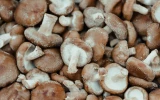Easy Shiitake Fruiting Block Recipe to Make at Home
If you're a fan of fresh and flavorful mushrooms, you'll love this easy shiitake fruiting block recipe that you can make at home. Shiitake mushrooms are a popular choice for their meaty texture and umami flavor, and with this recipe, you can grow your own at home without any specialized equipment.
To make a fruiting block, you need simple ingredients such as hardwood sawdust, wheat bran, gypsum, and mushroom spawn. After mixing them, they will be packed into a container and incubated for weeks. The mycelium will be soaked in water and placed in a humid environment to induce fruiting.
Below, you'll find some simple hacks to help you enjoy a bountiful harvest of shiitake mushrooms right in your kitchen.
Summary
- To make an easy shiitake fruiting block at home, you'll need a few simple ingredients, including hardwood sawdust, wheat bran, gypsum, and mushroom spawn.
- With proper care and attention, you can expect to harvest delicious shiitake mushrooms in just a few weeks.
- This recipe is a great way to get started with mushroom cultivation and enjoy the satisfaction of growing your food at home.
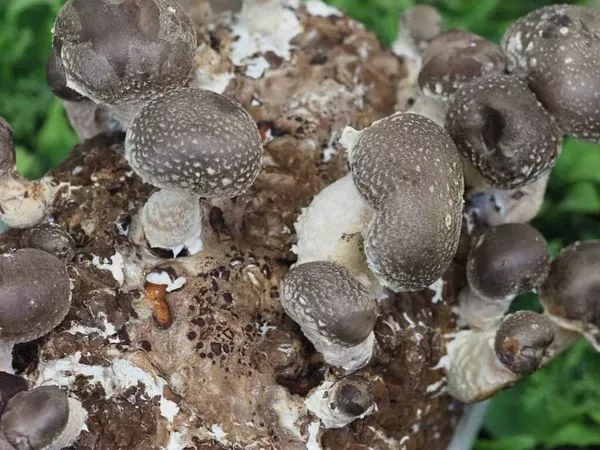
On this page:
How to Make Shiitake Fruiting Blocks At Home
If you're looking for a fun and easy project to try at home, making a shiitake fruiting block is a great place to start. With this simple recipe, you can enjoy a bountiful harvest of delicious shiitake mushrooms right in your own home. Here's what you'll need:
Ingredients for shiitake fruiting blocks:
- 5 pounds of hardwood sawdust
- 1 pound wheat bran
- 1/2 cup gypsum
- 2 cups mushroom spawn
Equipment needed to make shiitake blocks:
- Large mixing bowl
- Plastic container with lid
- Aluminum foil
- Spray bottle
- Incubation space
- Water source
Instructions for making shiitake blocks:
-
In a large mixing bowl, combine the sawdust, wheat bran, and gypsum.
-
Add the mushroom spawn to the mixture and stir well.
-
Pack the mixture into a plastic container and cover it with aluminum foil.
-
Incubate the container in a warm, dark place for 4-6 weeks, or until the mycelium has colonized the block.
-
Fill a spray bottle with water and mist the block several times a day to maintain humidity.
-
After the mycelium has fully colonized the block, remove the aluminum foil and soak the block in water for 12-24 hours.
-
Place the block in a humid environment with indirect light and wait for the mushrooms to fruit.
-
Harvest the mushrooms by twisting them off the block at the base.
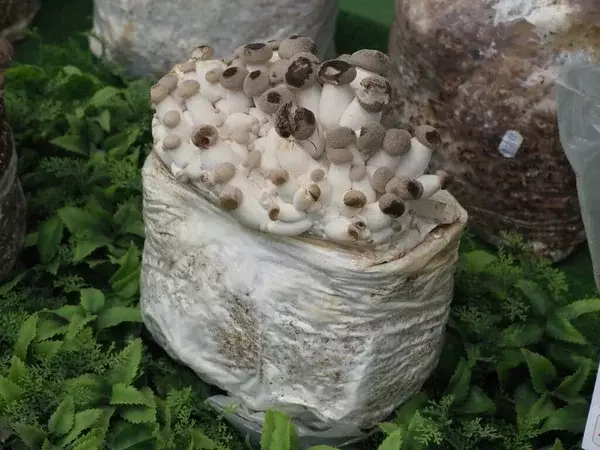
The Common Formula for Shiitake Fruiting Block
The exact ratios of each ingredient can vary depending on the recipe, but a common formula is 5 parts sawdust, 1 part wheat bran, 0.5 parts gypsum, and 2 parts mushroom spawn.
To make a shiitake fruiting block, you'll need a mixture of hardwood sawdust, wheat bran, gypsum, and mushroom spawn.
- The sawdust provides the bulk of the substrate for the mycelium to grow on, while the wheat bran adds nutrients and helps to create a favorable environment.
- Gypsum is added to adjust the pH of the mixture and improve its water-holding capacity.
- The mushroom spawn is added to inoculate the substrate with the shiitake mycelium.
6 Hacks for Making a Shiitake Fruiting Block Recipe at Home
Below are some simple hacks you can use when making a shiitake fruiting block recipe at home. By following these simple hacks, you can create a successful shiitake fruiting block recipe at home and enjoy a bountiful harvest of delicious mushrooms.
1. Choose high-quality ingredients
Choosing high-quality ingredients is essential when making a shiitake fruiting block recipe at home. Here are some tips on how to choose the best ingredients:
-
Choose fresh, untreated, and pesticide-free sawdust or hardwood chips. The ideal size should be between 1/8" and 3/8" in diameter, as this provides enough surface area for the shiitake spawn to colonize.
-
Choose a high-quality shiitake spawn that is certified free of contaminants, such as bacteria, viruses, or competing fungi. You can buy shiitake spawn online or from a reputable supplier.
-
Choose high-quality shiitake mushroom plugs that are fresh and free of any visible damage or mold. The plugs should be stored in a cool, dry place until ready to use.
-
You can add nutrients to your shiitake fruiting block recipe to promote healthy mushroom growth. Common nutrient sources include wheat bran, soybean meal, and cottonseed meal. Make sure that the nutrients you use are fresh and high-quality.
-
Use clean, filtered, or distilled water when making your fruiting blocks. Avoid using tap water, as it may contain chlorine or other chemicals that can harm the shiitake mycelium.
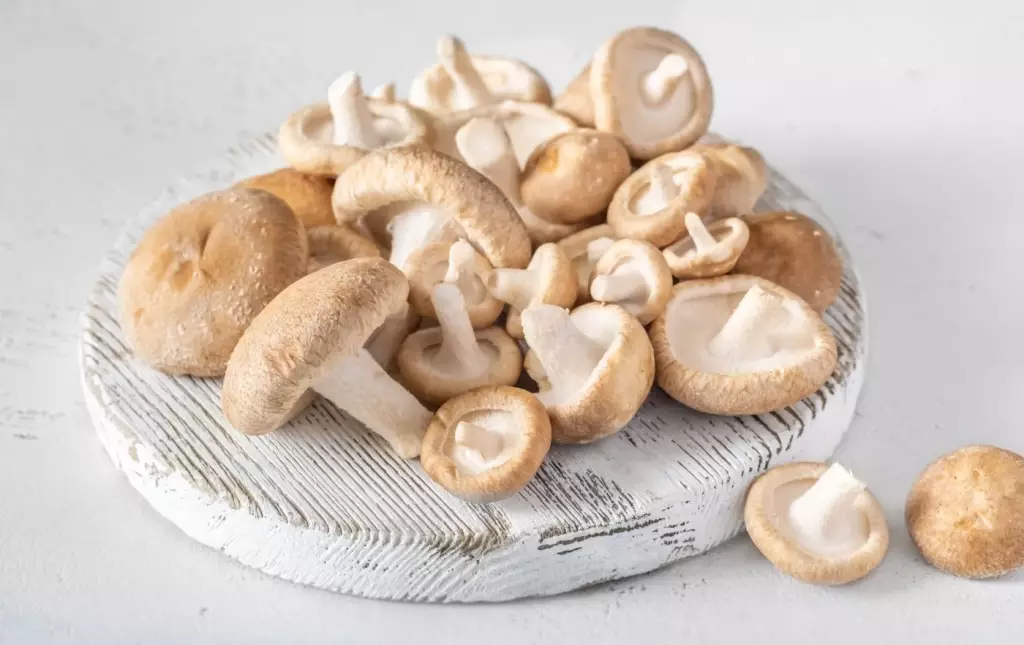
By choosing high-quality ingredients, you can ensure that your shiitake fruiting blocks are healthy, productive, and free of contaminants.
2. Sterilize your materials
Sterilize your sawdust or hardwood chips, spawn, and mushroom plugs to kill off any harmful bacteria or fungi that could compete with your shiitake mushrooms. Place your materials inside a microwave-safe bag and heat them on high for 5-7 minutes.
If you have access to an autoclave, this is the most effective way to sterilize your materials. Place your materials inside a sterilization pouch, and then heat them in the autoclave at 121°C (250°F) for 20-30 minutes.
3. Use a pressure cooker
The most effective way to sterilize your materials is by using a pressure cooker. Fill the pressure cooker with water, place your materials inside a heat-resistant bag, and seal it tightly. Then, steam the materials in the pressure cooker for 2-3 hours at 15 psi.
4. Monitor temperature and humidity
Keep a close eye on the temperature and humidity of your fruiting blocks. Shiitake mushrooms prefer temperatures between 60-80°F and humidity levels around 85%.
5. Allow for air exchange
Ensure that your fruiting blocks have adequate air exchange to help prevent the buildup of harmful gases and promote healthy mushroom growth. This can be achieved by poking small holes in the plastic bag or using a specialized mushroom-growing container with a ventilation system.
6. Be patient with the process
Shiitake mushrooms can take several weeks or even months to fully mature. Be patient and continue to monitor your fruiting blocks regularly to ensure that they are healthy and productive.
Advantages of Making a Shiitake Fruiting Block Recipe At Home
Making a shiitake fruiting block recipe at home has several advantages.
-
It's a fun and rewarding hobby that can provide a sense of satisfaction and accomplishment.
-
It allows you to grow fresh and flavorful mushrooms right in your kitchen, which can be a cost-effective and sustainable way to incorporate more mushrooms into your diet.
-
Growing your mushrooms gives you more control over the quality and safety of the food you eat.
-
Making a shiitake fruiting block at home requires minimal equipment and can be done with basic ingredients, making it accessible to anyone interested in trying it out.
Disadvantages of Making a Shiitake Fruiting Block Recipe At Home
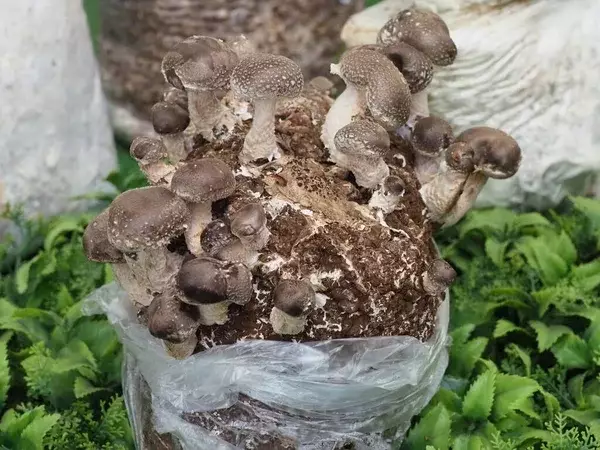
While making a shiitake fruiting block recipe at home has many advantages, there are also some potential disadvantages to consider.
-
It can be a time-consuming process, requiring several weeks or even months of incubation time before the mushrooms are ready to harvest.
-
Growing mushrooms at home requires a certain level of knowledge and skill, which can take time and practice to develop.
-
There is a risk of contamination, which can lead to the growth of unwanted fungi or bacteria on the fruiting block. This can be avoided with proper sterilization techniques, but it's still a risk to consider.
-
Growing your mushrooms at home can be more expensive than buying them from a store, particularly if you need to purchase specialized equipment or supplies.

